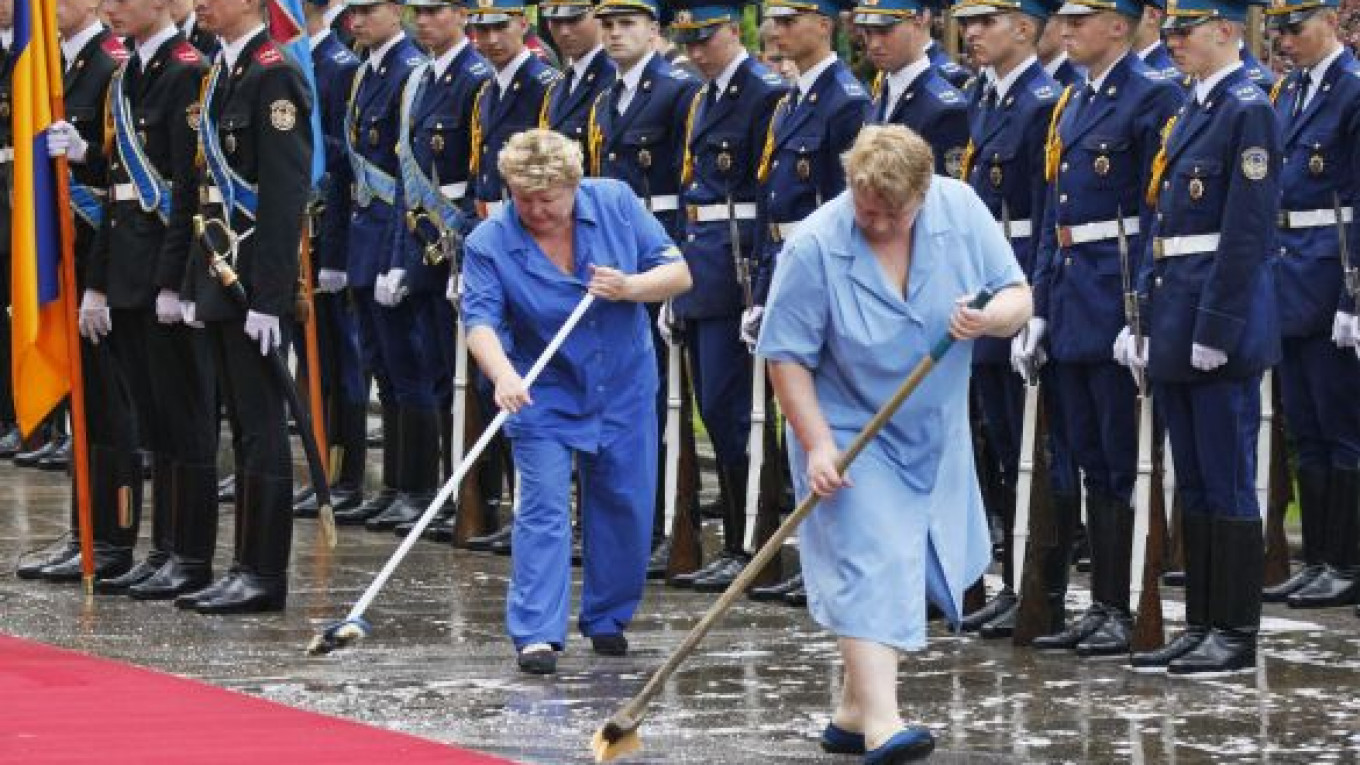A thunderstorm made a wet start for the first trip by a Kremlin leader to Ukraine in five years, but President Dmitry Medvedev joked that the rain had "washed away" bad blood between the countries.
Medvedev signed a raft of agreements with President Viktor Yanukovych at the start of a two-day visit to Ukraine, including on border demarcation, aerospace, interbank cooperation and cooperation between intelligence services.
But difficulties were expected in talks on natural gas after Kiev's cool reception of a proposal by Prime Minister Vladimir Putin to merge Gazprom and Naftogaz, the countries' main state energy holdings.
Medvedev and Yanukovych, however, were all smiles Monday as they moved to deepen a thaw in relations between their countries that started with Yanukovych's election in February.
Medvedev said at the start of talks that trade between both countries had doubled since the start of the year because of the leadership change in Kiev.
“It’s easier for us to talk,” he said in televised remarks.
The last official visit by a Russian president was in early 2005, shortly after the pro-Western Viktor Yushchenko rode to the presidency in a rerun of a flawed election won by Yanukovych.
Speaking to reporters after Monday's talks, Medvedev said mutual trade should be worth $35 billion this year and that the figure should rise to $100 billion in a year.
Medvedev and Yanukovych lit oil lamps at a memorial to the Holodomor famine of the 1930s — an unusual gesture because Yushchenko had angered Moscow by demanding that the famine be recognized as genocide by Soviet leader Josef Stalin.
The ceremony was marred by a thunderstorm, but both leaders brushed off the bad weather with jokes.
Whether the two leaders would discuss a merger between Gazprom and Naftogaz was unclear. Yanukovych has said Kiev would participate in a merger only on fully equal terms and that no energy deals would be reached during Medvedev's visit.
But Gazprom CEO Alexei Miller told reporters in Kiev that talks on unifying the companies would continue.
Ukrainian pipelines deliver about 80 percent of Russia's gas exports to Europe, but Gazprom has twice in the past four years cut supplies to Ukraine because of pricing disputes.
Putin's merger proposal came only days after Medvedev and Yanukovych signed a landmark deal on April 21 that awarded Ukraine as much as $45 billion in gas subsidies in return for an extended lease on the Russian Black Sea Fleet’s base in Crimea. ?
The agreement appeared to tilt Kiev's policy firmly toward Moscow and caused an outcry among Yanukovych's opponents.
On Monday, about 100 activists from the Svoboda nationalist group held a protest in Kiev against the government's policies toward Moscow, which they described as selling out Ukraine's national interests.
The border agreement signed Monday refers to the Kerch Strait between Ukraine's Crimean and Russia's Taman peninsulas, where the exact delineation has been unclear.
Former Prime Minister Yulia Tymoshenko warned over the weekend that the agreement could mean that Ukraine would lose Tuzla, a tiny island located in the strait.
Details of the agreement were unclear Monday, but Yevgeny Kiselyov, a political analyst and Ukrainian talk show host, said it still sent an important message: that Crimea belongs to Ukraine.
"Recognizing the existing border means recognizing that Crimea is an inseparable part of Ukraine and that any further territorial claims will be impossible," he told The Moscow Times.
Some Russian politicians have called on Russia to seize Crimea and asserted that Sevastopol, where the Black Sea Fleet is based, still belongs to Russia.
Kiselyov said the border deal would also dampen criticism from the Ukrainian opposition that Yanukovych had "sold Crimea" to Moscow with the Black Sea Fleet deal.
State Duma Deputy Sergei Markov conceded that bilateral relations have improved vastly but said some old problems remain. He cited as examples Yanukovych's failure to make good on a pre-election promise to raise Russian to the status of a state language and the fact that Ukrainian schools still use history textbooks written under Yushchenko that describe Russia in "hostile" terms.
Kiselyov said Yanukovych's ascent to power did not necessarily mean an easy ride for Moscow.
"Yanukovych is also a Ukrainian patriot — probably as much as Tymoshenko. Some in Moscow will have to face unpleasant surprises in one or two years because there just aren't any pro-Russian leaders in Ukraine," he said.
A Message from The Moscow Times:
Dear readers,
We are facing unprecedented challenges. Russia's Prosecutor General's Office has designated The Moscow Times as an "undesirable" organization, criminalizing our work and putting our staff at risk of prosecution. This follows our earlier unjust labeling as a "foreign agent."
These actions are direct attempts to silence independent journalism in Russia. The authorities claim our work "discredits the decisions of the Russian leadership." We see things differently: we strive to provide accurate, unbiased reporting on Russia.
We, the journalists of The Moscow Times, refuse to be silenced. But to continue our work, we need your help.
Your support, no matter how small, makes a world of difference. If you can, please support us monthly starting from just $2. It's quick to set up, and every contribution makes a significant impact.
By supporting The Moscow Times, you're defending open, independent journalism in the face of repression. Thank you for standing with us.
Remind me later.


